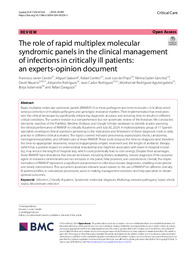Título :
The role of rapid multiplex molecular syndromic panels in the clinical management of infections in critically ill patients: an experts-opinion document |
Autor :
Candel, Francisco Javier 
Canton, Rafael 
Canton, Rafael 
Del Pozo, Jose L 
Galán Sánchez, Fátima 
Navarro, David
RODRIGUEZ DIAZ, JUAN CARLOS 
RODRIGUEZ DIAZ, JUAN CARLOS 
Rodríguez Aguirregabiria, Montserrat Aránzazu 
Suberviola, Borja 
Zaragoza, Rafael  |
Editor :
BioMed Central |
Departamento:
Departamentos de la UMH::Producción Vegetal y Microbiología |
Fecha de publicación:
2024-12-30 |
URI :
https://hdl.handle.net/11000/35453 |
Resumen :
Rapid multiplex molecular syndromic panels (RMMSP) (3 or more pathogens and time-to-results < 6 h) allow simultaneous detection of multiple pathogens and genotypic resistance markers. Their implementation has revolutionized the clinical landscape by significantly enhancing diagnostic accuracy and reducing time-to-results in different critical conditions. The current revision is a comprehensive but not systematic review of the literature. We conducted electronic searches of the PubMed, Medline, Embase, and Google Scholar databases to identify studies assessing the clinical performance of RMMSP in critically ill patients until July 30, 2024. A multidisciplinary group of 11 Spanish specialists developed clinical questions pertaining to the indications and limitations of these diagnostic tools in daily practice in different clinical scenarios. The topics covered included pneumonia, sepsis/septic shock, candidemia, meningitis/encephalitis, and off-label uses of these RMMSP. These tools reduced the time-to-diagnosis (and therefore the time-to-appropriate treatment), reduced inappropriate empiric treatment and the length of antibiotic therapy (which has a positive impact on antimicrobial stewardship and might be associated with lower in-hospital mortality), may reduce the length of hospital stay, which could potentially lead to cost savings. Despite their advantages, these RMMSP have limitations that should be known, including limited availability, missed diagnoses if the causative agent or resistance determinants are not included in the panel, false positives, and codetections. Overall, the implementation of RMMSP represents a significant advancement in infectious disease diagnostics, enabling more precise and timely interventions. This document addresses relevant issues related to the use of RMMSP on different critically ill patient profiles, to standardize procedures, assist in making management decisions and help specialists to obtain optimal outcomes
|
Palabras clave/Materias:
Critically ill patient
Infection
Multidrug resistant pathogens
Septic shock
Sepsis
Bloodstream infection
Syndromic molecular diagnosis |
Tipo de documento :
info:eu-repo/semantics/article |
Derechos de acceso:
info:eu-repo/semantics/openAccess
Attribution-NonCommercial-NoDerivatives 4.0 Internacional |
DOI :
https://doi.org/10.1186/s13054-024-05224-3 |
Publicado en:
Critical care 2024 Dec 30;28(1):440 |
Aparece en las colecciones:
Artículos - Producción vegetal y microbiología
|
 La licencia se describe como: Atribución-NonComercial-NoDerivada 4.0 Internacional.
La licencia se describe como: Atribución-NonComercial-NoDerivada 4.0 Internacional.
.png)
